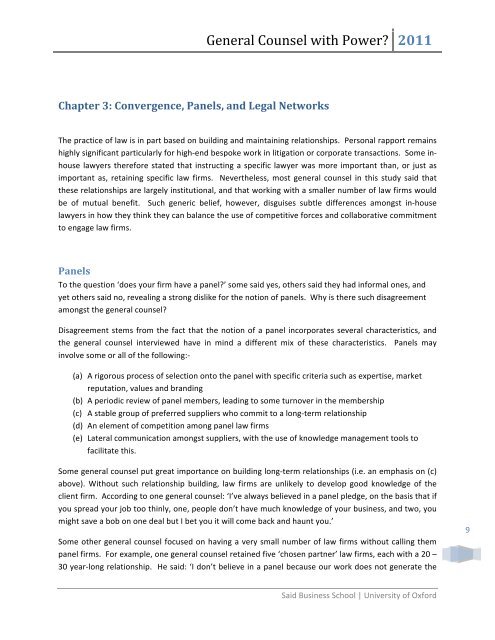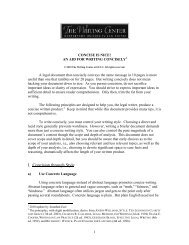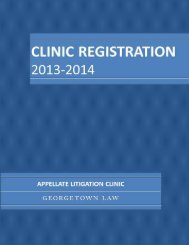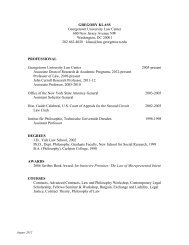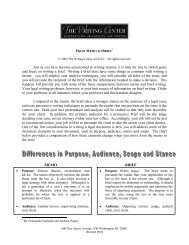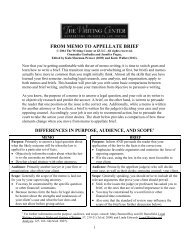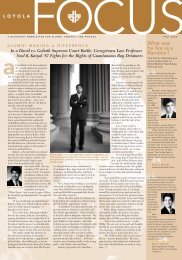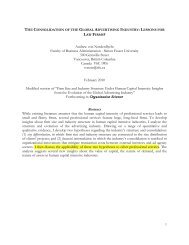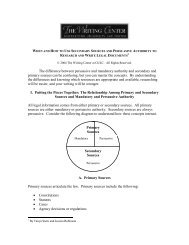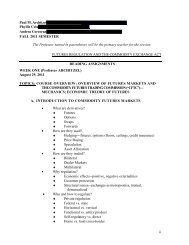Date: April 12, 2013 Topic: The Shrinking ... - Georgetown Law
Date: April 12, 2013 Topic: The Shrinking ... - Georgetown Law
Date: April 12, 2013 Topic: The Shrinking ... - Georgetown Law
You also want an ePaper? Increase the reach of your titles
YUMPU automatically turns print PDFs into web optimized ePapers that Google loves.
General Counsel with Power? 2011 <br />
Chapter 3: Convergence, Panels, and Legal Networks <br />
<strong>The</strong> practice of law is in part based on building and maintaining relationships. Personal rapport remains <br />
highly significant particularly for high-‐end bespoke work in litigation or corporate transactions. Some in-house<br />
lawyers therefore stated that instructing a specific lawyer was more important than, or just as <br />
important as, retaining specific law firms. Nevertheless, most general counsel in this study said that <br />
these relationships are largely institutional, and that working with a smaller number of law firms would <br />
be of mutual benefit. Such generic belief, however, disguises subtle differences amongst in-‐house <br />
lawyers in how they think they can balance the use of competitive forces and collaborative commitment <br />
to engage law firms. <br />
Panels <br />
To the question ‘does your firm have a panel?’ some said yes, others said they had informal ones, and <br />
yet others said no, revealing a strong dislike for the notion of panels. Why is there such disagreement <br />
amongst the general counsel? <br />
Disagreement stems from the fact that the notion of a panel incorporates several characteristics, and <br />
the general counsel interviewed have in mind a different mix of these characteristics. Panels may <br />
involve some or all of the following:-‐ <br />
(a) A rigorous process of selection onto the panel with specific criteria such as expertise, market <br />
reputation, values and branding <br />
(b) A periodic review of panel members, leading to some turnover in the membership <br />
(c) A stable group of preferred suppliers who commit to a long-‐term relationship <br />
(d) An element of competition among panel law firms <br />
(e) Lateral communication amongst suppliers, with the use of knowledge management tools to <br />
facilitate this. <br />
Some general counsel put great importance on building long-‐term relationships (i.e. an emphasis on (c) <br />
above). Without such relationship building, law firms are unlikely to develop good knowledge of the <br />
client firm. According to one general counsel: ‘I’ve always believed in a panel pledge, on the basis that if <br />
you spread your job too thinly, one, people don’t have much knowledge of your business, and two, you <br />
might save a bob on one deal but I bet you it will come back and haunt you.’ <br />
Some other general counsel focused on having a very small number of law firms without calling them <br />
panel firms. For example, one general counsel retained five ‘chosen partner’ law firms, each with a 20 – <br />
30 year-‐long relationship. He said: ‘I don’t believe in a panel because our work does not generate the <br />
9 <br />
Said Business School | University of Oxford


